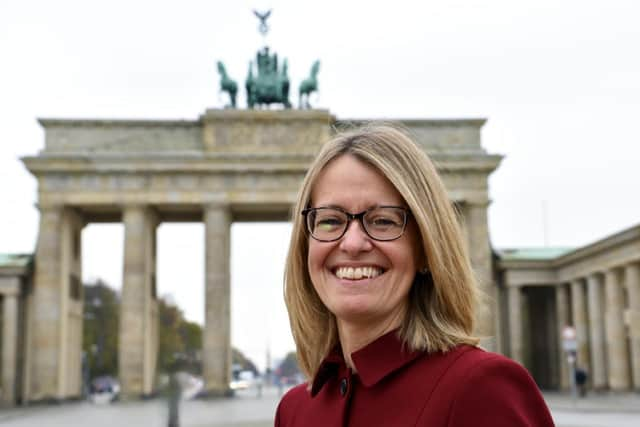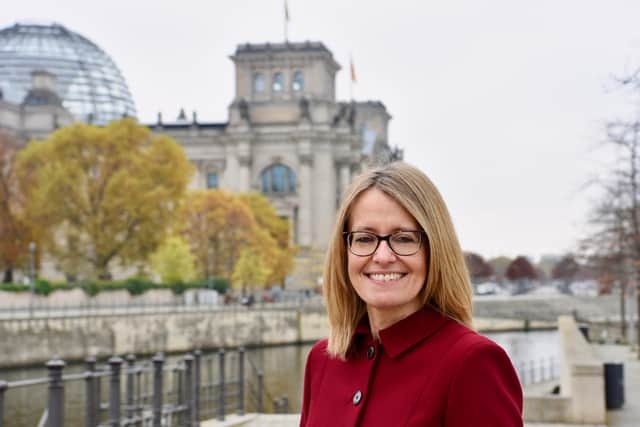University of Edinburgh graduate among UK’s first women ambassadors to all G7 countries
and live on Freeview channel 276
Jill Gallard, who studied French and Spanish at the University of Edinburgh 30 years ago, was the UK’s first women ambassador to Germany when she took up her post last November.
Completing the six will be Former High Commissioner to Australia Menna Rawlings, who officially starts her role as ambassador to France on Monday, following 43 men in the post.
Advertisement
Hide AdAdvertisement
Hide AdShe will join the other four: Susan Jane le Jeune d'Allegeershecque, High Commissioner to Canada, Dame Karen Pierce, UK ambassador to the United States, Jill Morris, the first of the six to be appointed, to Italy in 2016, and Julia Longbottom, who took up her post in Japan in March.


The UK’s other female ambassadors are Caroline Wilson (China), Dame Barbara Woodward (envoy to the United Nations) and Deborah Bronnert (Russia).
UK women high commissioners to other Commonwealth countries include Victoria Treadell (Australia) and Catriona Laing (Nigeria).
They are among more than 60 female heads of mission for the UK abroad, which have tripled from 22 over the last decade and now account for nearly one third of the total.
Advertisement
Hide AdAdvertisement
Hide AdThe G7 milestone comes 45 years after Dame Anne Warburton became the UK’s first female ambassador, to Denmark.


The first married woman was not appointed as an ambassador until ten years later.
Women had been banned by the Foreign Office from diplomatic roles until 1946, and had to resign if they got married until as late as 1973.
Ms Gallard, 53, who was born at Omagh in Northern Ireland, who first became an ambassador ten years ago, to Portugal, said: “It’s just bizarre now to think that in my lifetime female diplomats were required to quit if they got married.
Advertisement
Hide AdAdvertisement
Hide Ad"When I joined the Foreign Office in 1991, I’d always thought I’d have to leave if I got married and had kids.
“All the senior women seemed to be single or not have children, and so the message that sent was that, actually you cannot do this job and have a family if you are a woman.
“My husband and I didn’t marry until our late 30s.
"When I had my first posting as an Ambassador to Lisbon in 2011, our sons were only aged three and one.
“I remember at the time, I could not find a female British ambassador who had done the job with such young children.
Advertisement
Hide AdAdvertisement
Hide Ad"It’s very different now, but back then I remember being very nervous about all of the evening commitments.
"I thought, ‘I’ll just have to do my best’.
“Having a very hands-on husband helps. Moving around, I used to think I’d have to marry a poet who could sit on a mountain wherever I was posted but I married a civil servant who is very portable.
“When my boys were toddlers, I would always try to go home for five o’clock for tea and bath-time, then I would go to a reception and be like an Exocet missile, talking to the most important people, and then escape so I could be back for bedtime as often as possible.”
“My generation are now the first to do this job with working spouses and kids and we are definitely heading in the right direction.
Advertisement
Hide AdAdvertisement
Hide Ad“I’ve worked with all of the female ambassadors currently in the key roles and it’s almost like a sisterhood because we’ve come up the hard way.
“When we started, you’d look up and not see any people like you, so many of us spend a lot of time mentoring younger female diplomats.
"None of that existed 20 years ago.”
The ambassador fondly recalls her time as a student in Edinburgh, but left because there were no suitable jobs.
She said: “I absolutely loved Scotland.
"I’d have stayed there if I could but back then there weren’t really any jobs with languages in Edinburgh.
"It’s very different now.
Advertisement
Hide AdAdvertisement
Hide Ad“Shocking to say, but the biggest excitement in those days, was that the pubs were open until 3am because in Northern Ireland they all still shut at 11pm.
“The first year I was in Pollok Halls and then I had various flats off The Meadows and one year I was just off Charlotte Square in the New Town.
"It was a basement flat with no central heating.
“Hilariously, fast forward 30 years almost, I was sat in a Portuguese vineyard chatting to the owners and it turned out his son in his 20s had just finished studying at Edinburgh and we’d rented the same flat from a Scottish QC, so it’s a small world.
“I’ve got 26 cousins and I raved about Edinburgh so much that a lot of them followed me to Edinburgh University, as did the next generation, so I’ve set a trend.”
Advertisement
Hide AdAdvertisement
Hide AdMs Gallard played a key role in the UK’s joint declaration with Germany over foreign and security policy cooperation in June.
It included climate change, human rights and international development and was signed by Foreign Secretary Dominic Raab and his German counterpart Heiko Maas.
She said: “Many Germans are openly disappointed that the UK has chosen to leave the EU but at the same time they are pragmatic and understand it was a democratic decision.
“The UK-Germany joint declaration is all about how we look forward and work together on the big global challenges.
Advertisement
Hide AdAdvertisement
Hide Ad"Our force for good agenda really chimes with a lot of what Germany foreign policy is on issues such as climate change, democracy, human rights, and international development.”
A message from the Editor:
Thank you for reading this article. We're more reliant on your support than ever as the shift in consumer habits brought about by coronavirus impacts our advertisers.
If you haven't already, please consider supporting our trusted, fact-checked journalism by taking out a digital subscription.
Comment Guidelines
National World encourages reader discussion on our stories. User feedback, insights and back-and-forth exchanges add a rich layer of context to reporting. Please review our Community Guidelines before commenting.
